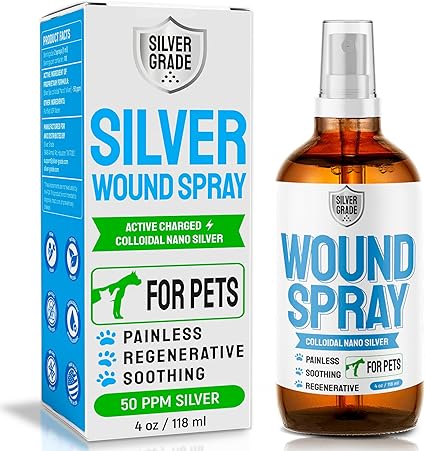Colloidal Silver For Dogs: What’s The Latest Evidence?
When you purchase through links on our site, we may earn a commission. Here’s how it works.
Silver has been used for its antibacterial properties for centuries. It lost favor a little when antibiotics were invented but has regained popularity in the last decade due to growing concerns over antibacterial resistance. In fact, around 5,000 new applications for silver products have been registered during that time.
Products containing colloidal silver have gained popularity, especially with dog owners recently, with many internet sources claiming silver is a one-stop cure for a wide range of health issues. But do silver products really work? Perhaps more importantly, is colloidal silver safe for dogs? Let’s review the evidence so far.

What Is Colloidal Silver?
Silver is a naturally occurring element found in the environment combined with other elements (such as sulfide or nitrate). A colloid is defined by the Cambridge dictionary as “a mixture in which particles of one substance are held inside another substance.” The particles do not dissolve. So, colloidal silver is tiny particles of silver held in a liquid.
Colloidal silver is used in a wide range of products for both consumer and industrial use. People have used it to treat a whole range of health issues, such as infections, skin conditions, and hay fever. It can even be found in shower gels and deodorants. However, not only is there a lack of evidence to support the use of colloidal silver, but there is also a growing body of evidence that it may not always be safe.
Colloidal Silver Uses For Dogs
If you search online, you will find many websites jumping on colloidal silver as a magic cure for a whole host of conditions. They market colloidal silver for dogs’ itchy skin, colloidal silver for dog ear infections, colloidal silver for dogs’ itchy paws, and wound care, to name a few. It comes as a colloidal silver spray for dogs, as a cream, and even as a solution to give by mouth.
The two important questions to ask here are: 1) Is there any scientific basis to the claims that colloidal silver benefits dogs, and 2) Is colloidal silver safe for dogs?
Colloidal Silver Benefits For Dogs
There is some evidence to support the efficacy of colloidal silver in some situations. For example, a 2023 study in The Journal of American Animal Hospital Association (JAAHA) looked at how effective a silver-based shampoo is for the treatment of Malassezia (a yeast infection) in dogs. While the study concluded that silver shampoos may be effective in treating Malassezia infections, it also acknowledged that larger studies were needed to determine how well it works, as well as the best concentration and dose to use. A 2013 study in the Journal of Alternative Complementary Medicine supported the use of colloidal silver as an antimicrobial against bacteria, with lesser effect on fungi.
On the flip side, a study in 2013 for the Journal of Wound Care concluded that “claims of colloidal silver’s antimicrobial potency are misleading, and there is no place for it as an antiseptic.” Another study in 2020 looked at 14 silver products. It found there was a significant difference between the concentration of silver actually found in the products, and the amount the manufacturers claimed was in the product. They conclude that there is a “need for a more rigorous approach regarding the manufacturing, labeling, and use of silver-containing products.”
So the bottom line is that colloidal silver probably can be effective in some situations, but further study is needed.
Is Colloidal Silver Safe?
In terms of safety, The Food and Drugs Administration (FDA) issued a statement in 1999 stating that “all over-the-counter (OTC) drug products containing colloidal silver ingredients or silver salts for internal or external use are not generally recognized as safe and effective and are misbranded.” It has not retracted the statement since, and their advice still stands.
Many OTC drug products containing colloidal silver ingredients or silver salts are being marketed for numerous serious disease conditions and FDA is not aware of any substantial scientific evidence that supports the use of OTC colloidal silver ingredients or silver salts for these disease conditions.
FDA ruling in 1999
In 2020 The Journal of Oncology Pharmacy Practice published a report of acute myeloid leukemia in a patient who had been taking colloidal silver as a nutritional supplement for over 10 years. They reviewed the literature and found that long-term use of colloidal silver leads to colloidal silver building up in various tissues and organs. It concluded that “using OTC colloidal silver does not promote health, long-term use may be hazardous.”
A number of studies have warned of the possible adverse effects of over-using silver, such as organ damage, harming the environment, and bacterial resistance to silver. In particular, one study reviewed a decade of antibacterial use of silver in both medicinal and general consumer products. It concluded that “there is ample evidence that there can be adverse long-term effects from consumption or exposure to silver.” The authors suggest that silver products should only be used when absolutely necessary and only in products that would not release any silver into the environment.
The Bottom Line: Can Dogs Have Colloidal Silver?
At present, there is not enough evidence to prove the benefits of colloidal silver and too much evidence of its possible harm. This means the risk outweighs the benefit. The key points to remember:
- You should never give anything to your dog without consulting your veterinarian first.
- Even over-the-counter products, including colloidal silver, can interact with some medicines.
- Silver colloid products are unregulated, and often, what they actually contain does not match what they claim to contain.
- Silver is not an essential nutrient, despite some product claims.
- The FDA advises against the use of colloidal silver products.
- Over-use of colloidal silver can contribute to antibacterial resistance and harm the environment.
- Long-term use of silver products may be harmful.

You should not give colloidal silver by mouth to your dog, as there is not enough evidence for its safety and benefits. There are some situations when topical colloidal silver may be useful, for example, in preventing infections in burns or wounds or when used in hospitals to coat medical devices. However, due to the points above, you should only use colloidal silver products under the direction of your veterinarian.
Frequently Asked Questions
Pup owners have a lot of questions about colloidal silver for dogs, and I’ve addressed the most common below. If you have further questions, please ask us in our comments.
Is Colloidal Silver Safe For Dogs?
There is not enough evidence to say that colloidal silver is safe for dogs, especially if given by mouth. There may be some situations where short-term topical use is safe, but you should always consult your veterinarian first.
How Can I Use Colloidal Silver For Dogs
If you’re wondering how to use colloidal silver for dogs, I’ll say that some colloidal silver creams and dressings may be useful in some situations. Your veterinarian can advise you if a product is safe, likely to be effective, or if there is a better alternative.
What Are The Side Effects Of Colloidal Silver For Dogs?
Reported side effects with long-term use include kidney damage, seizures, weight loss, reduced energy levels, and a blue-grey tinge to the mucous membranes. Topically, it can cause irritation to the skin and eyes.
How To Use Colloidal Silver For Dogs’ Eyes
You shouldn’t use colloidal silver for your dog’s eyes. Many serious eye conditions can look like simple conjunctivitis. If you are worried about your dog’s eyes or suspect that your dog has an eye infection, book an appointment with your veterinarian.
All-Natural Alternatives
If you’re looking for safe, all-natural remedies for some of your pup’s ailments, you have better choices than products containing colloidal silver. See our articles about the best home remedies for ear infections and 8 itchy skin home remedies for dogs. However, it’s essential for you to consult with your veterinarian before you try to treat your pup for any condition yourself.



